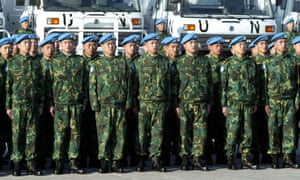Patrick Wintour
 The noise around Donald Trump will grab the most attention at the United Nations general assembly in New York this week, but the quietly growing influence of China is of equal concern to many western diplomats.
The noise around Donald Trump will grab the most attention at the United Nations general assembly in New York this week, but the quietly growing influence of China is of equal concern to many western diplomats.
China, for years prepared to take a back seat at the UN, is now seeking positions of power, increasing its budget contributions and starting to assert its world view, notably the preeminence of national sovereignty over human rights.
According to Richard Gowan, of the European Council for Foreign Relations, the story of the last year at the UN has been one of the rise of China. “It has been happening for decades but it has been massively accelerating,” he said.
In part China is filling a space created by the withdrawal of the US from bodies such as the Geneva-based UN Human Rights Council and the UN’s cultural arm, Unesco.
“What you hear is that in committees dealing with trade and human rights, the Americans are hanging back. They are not being assertive, Gowan said. “By contrast the Chinese are dominating a lot of the conversations.”
Meanwhile, the UK’s departure from the European Union will weaken the distinctive European voice on the UN security council. This week will be the last general assembly at which two of the permanent seats on the security council are held by EU members – France and the UK.
In a sense China, through its resourcing of the UN, has earned a right to be heard. For a country wary of concepts such as the interventionist responsibility to protect, China has become the pillar of UN peacekeeping. From providing only 3% of total financial contributions in 2013, China now contributes 10.25% of the total UN peacekeeping budget. It has pledged to provide $1bn for peacekeeping over the next five years.
China has trained more than 8,000 People’s Liberation Army troops to serve as standby militia for UN peacekeeping operations. The US, by contrast, is cutting back, albeit from a higher spending base. The US ambassador to the UN, Nikki Hayley, has said the US is just getting started on its cuts to UN contributions.
Not surprisingly, China is seeking commensurate status within the UN. Although it has provided more peacekeeping troops than the other four permanent members of the security council combined since 2012, as yet no Chinese national holds a senior post in any of the 15-plus UN peacekeeping missions.
The fear is that now China has put heavy resources into peacekeeping and development, it will quite quickly add a third pillar of human rights to its UN portfolio. Human Rights Watch fears for instance there will be a “heavy-handed focus on dialogue and consensus and a reduction in transparency and accountability”.
Already, since returning to the Human Rights Council in Geneva in 2013 at the decision of President Xi Jinping, China has moved from discreet backmarker – the so-called policy of “hide and bide” – to a leading voice pressing for UN budgets on human rights work to be cut or NGO observer status and external funding to be questioned. It has even suggested the phrase “human rights defender” should be excised from the UN lexicon.
At the HRC’s March 2015 session China prepared 35 formal interventions, compared to 26 the year earlier, covering issues such as Syria, Eritrea and Belarus. It tabled its first HRC resolution in June 2017, titled “The contribution of development to the enjoyment of all human rights”, and followed this up in March 2018 with another prolix resolution, opposed by the US, titled “Promoting mutually beneficial cooperation in the field of human rights through win-win cooperation”. China was furious at the “haughty” US opposition.
Ted Piccone, of the Brookings Institution, said in a paper this month: “Both resolutions emphasised national sovereignty, called for quiet dialogue and cooperation rather than investigations and international calls to action, and pushed the Chinese model of state-led development as the path to improving their vision of collective human rights and social stability.”
The language, apparently unobjectionable, subtly changed objectives, he argued.
It is all part of a long game to shape the UN to China’s advantage – a game made that much more difficult for Europe to resist due to the current US president.
Since you’re here…
… we have a small favour to ask. At a time when factual, honest reporting is critical, The Guardian helps to provide accurate, timely reporting on our world. We are editorially independent, meaning we set our own agenda. Our journalism is free from commercial bias and not influenced by billionaire owners, politicians or shareholders. No one edits our Editor. No one steers our opinion. This is important because it enables us to give a voice to the voiceless, challenge the powerful and hold them to account.
More people are reading The Guardian’s independent, investigative journalism than ever but advertising revenues across the media are falling fast. And unlike many news organisations, we haven’t put up a paywall – we want to keep our journalism as open as we can. So you can see why we need to ask for your help. We do it because we believe our perspective matters – because it might well be your perspective, too.
No comments:
Post a Comment